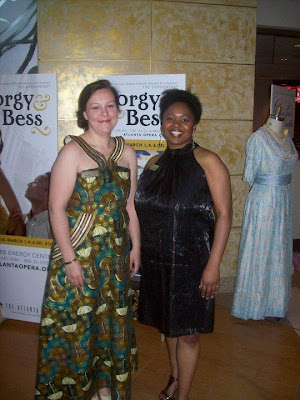 1. What is your role in the organization?
1. What is your role in the organization?I am the Director of Education. I manage all of the company’s education and outreach initiatives.
2. What are the education offerings at the Opera?
We have educational programs for young children all the way through adulthood. Our programs are divided into four categories: Programs for children and families, In-school programs, professional development, and community programs.
Programs for children and families: Include Opera Family Day, Girl Scout workshops, and other similar programs that are created through community partnerships and change from season to season.
 In-School Programs:
In-School Programs: • The Atlanta Opera Studio Tour, in which productions of children’s operas go out to all types of schools in the state of Georgia. The schools and students are provided with preparation materials that correspond directly to Georgia Performance Standards in Language Arts and Reading, Social Studies, Science and Mathematics.
• Opera Workshops that feature a singer and accompanist, directors, set and costume designers, or other professionals who contribute to a production and are tailored to meet the needs of a particular class/group and curriculum and are available year-round for schools, camps, youth groups, etc.
• Opera Trunks which are opera-related resources for the classroom, after-school programs, and youth groups. Each Trunk contains both a DVD and CD recording of a featured opera. They also feature additional books, CDs, activities and costume/prop elements which can make opera come alive for students while weaving its study throughout the various classroom subjects.
Professional Development Programs:
• High School Opera Institute, a training program for students, grades 10-12, who are interested in pursuing a career in music. Participants in this eight-month program attend monthly workshops and vocal coachings on topics that include: preparing and auditioning for a role; selecting a music school; characterization; diction; and vocal technique.
• Music! Words! Opera!, an arts-integrated curriculum that promotes opera as an excellent tool to aid students and teachers in their explorations of history, language, literature and music.
• Professional Development Workshops for Teachers.
• Arts Administration Internships that are designed to connect the learning goals of interns to hands-on experiences and training in the field of arts administration.
Community Programs include Opera Chat, which is an informal conversation with singers and artists from our upcoming productions at Barnes & Nobles – Buckhead; Opera 101, a multimedia presentation, hosted by board member Carter Joseph, introducing each of the main stage productions. We also offer Master Classes, National Opera Week activities and special collaborative programs with community partners in conjunction with our mainstage productions.
 3. What are the reasons for having education and outreach programs?
3. What are the reasons for having education and outreach programs?The programs support the audience development goals of The Atlanta Opera with the hopes of helping to continue to grow our future audience base. The programming of the Education Department also supports Atlanta’s arts community by supporting arts education programming in the public and private schools and institutions of higher learning throughout Metro Atlanta and the state of Georgia.
4. What are some of your favorite programs and accomplishments?
I’m really proud of our 24-Hour Opera Project that we started last year. It was so much fun, and I’m looking forward to doing it again this year and in the future to see how it grows and changes. I’m also really excited about our opera commission, Rabbit Tales. This is something that started as a “what if” discussion between myself and a colleague of mine several years ago. It’s really exciting to see it through the process as it starts to take form. I can’t wait to see it in its entirety, and more importantly, to see the community reaction to the piece.
5. Why do you do what you do?
I love music. I love opera. Music education, and the performing arts in general, have always been an extremely important part of my life. I love putting programs together for people to see all of the different aspects of this magical art form. It’s so multi-faceted - there’s really and truly something in it for everyone. My job is so fun! A lot of times it’s just a matter of putting together programs that I would find interesting and entertaining, or things that I think other people would find fun and entertaining!



















